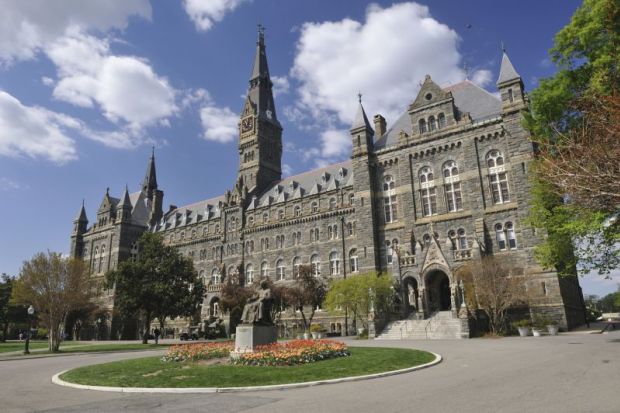Georgetown University has suspended – and is facing student demands that it fire – a conservative law expert who criticised Joe Biden’s promise to appoint a black woman to the US Supreme Court.
The scholar, Ilya Shapiro, had suggested on Twitter that Mr Biden choose an Indian-born federal judge, Sri Srinivasan, for the top court and lamented that the president’s campaign promise meant that the nation would get a “lesser black woman”.
The Black Law Students Association at Georgetown assembled a petition with more than 1,000 signatures calling for Mr Shapiro to be fired, and some students staged a sit-in protest at the law school to reinforce the message. More than 150 faculty from universities across the US signed a separate petition backing Mr Shapiro.
The Georgetown law dean, William Treanor, met with students, called Mr Shapiro’s postings on the matter “appalling”, and promised a formal investigation during the suspension of whether he violated university conduct policies and should face further repercussions.
“Racial stereotypes about individual capabilities and qualifications remain a pernicious force in our society and our profession,” Professor Treanor said in a message to the Georgetown law community. “I am keenly aware that our law school is not exempt.”
The dean acted just one day before Mr Shapiro, the outgoing head of constitutional studies at the Cato Institute, a libertarian thinktank, was due to become a senior lecturer and executive director of the Georgetown Center for the Constitution.
Along with his Twitter posting about a “lesser black woman”, Mr Shapiro said a Supreme Court justice chosen only from among black women “will always have an asterisk attached”.
As the controversy erupted, Mr Shapiro removed those postings and added new entries in which he apologised, saying, “I meant no offence, but it was an inartful tweet.” He added: “I’m optimistic that Georgetown’s investigation will be fair, impartial and professional, though there’s really not much to investigate.”
At a point in the 2020 presidential campaign when Mr Biden needed a key endorsement, he promised that he would appoint a black woman to the Supreme Court if he got the chance. He reiterated that commitment in recent days after current Justice Stephen Breyer announced his planned retirement.
The Black Law Students Association, in its petition, said Mr Shapiro “has a history of publicly discounting and degrading women of colour”, including Sonia Sotomayor, another current Supreme Court justice.
Mr Shapiro’s comments “were not just inartful”, the petitioners said. “They were offensive, sexist, racist, misogynistic, inflammatory, deplorable, insensitive and unprofessional.”
The faculty petition supporting Mr Shapiro was organised by the Foundation for Individual Rights in Education, a group that calls itself non-partisan but regularly promotes the argument popular among conservatives that US higher education suffers from widespread and excessive restraints on free speech.
Its petition contended that Mr Shapiro, in using the phrase “lesser black woman”, apparently meant to say that the Supreme Court would get “a less-qualified” black woman.
“But setting aside that one mistake – which should not be seen as a fireable offense – the substance of the message, which is that Sri Srinivasan is the most qualified progressive nominee, and that it’s wrong for the president to pass him over because of race and sex, is a position that is most certainly protected by academic freedom principles,” said the faculty petitioners, hailing overwhelmingly from outside of Georgetown.
The sit-in protest by Georgetown law students led to an hour-long meeting with Professor Treanor. The students said they told the dean that the law school’s “inability to draw a bold line between conservatism and racism has come at the expense of our black students”. They also said the law school “lacks the institutional safeguards to protect its black students from threats inside of and outside of the classroom”.
Register to continue
Why register?
- Registration is free and only takes a moment
- Once registered, you can read 3 articles a month
- Sign up for our newsletter
Subscribe
Or subscribe for unlimited access to:
- Unlimited access to news, views, insights & reviews
- Digital editions
- Digital access to THE’s university and college rankings analysis
Already registered or a current subscriber? Login








